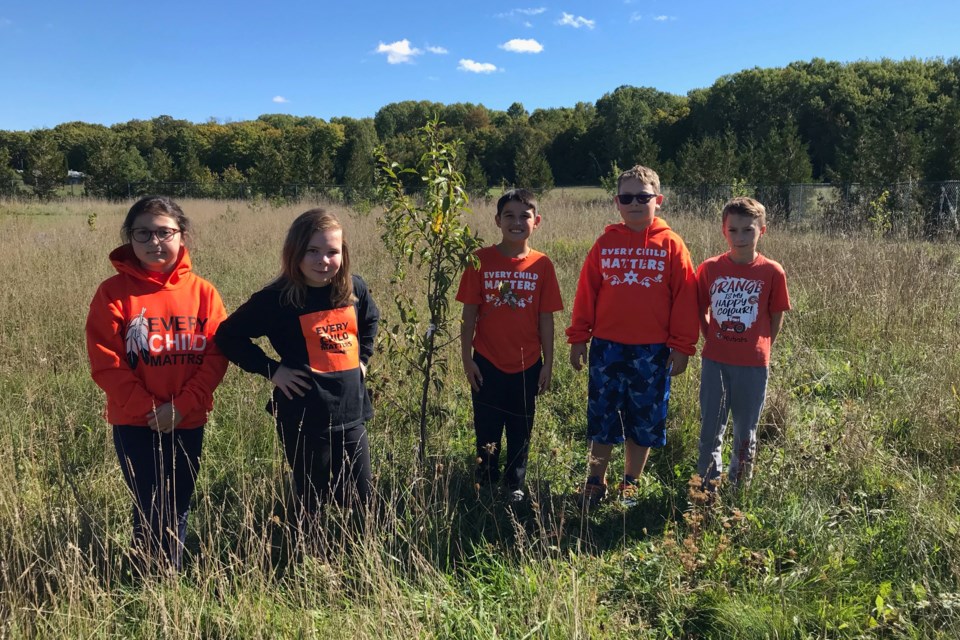NEWS RELEASE
RAINBOW DISTRICT SCHOOL BOARD
*************************
Central Manitoulin Public School and Manitoulin Secondary School have received a grant from the David Suzuki Foundation to create green spaces dedicated to reconciliation. The David Suzuki Foundation is supporting the projects in partnership with the National Healing Forests Initiative. The local projects are among 16 being funded across Canada this year.
The Central Manitoulin Public School Wellness Orchard in Mindemoya will encompass a fruit orchard and garden that will provide opportunities for students to connect with nature. The Kinoo Wiiyaa Minoyaa (place where everyone becomes well in mind and spirit) Healing Forest will occupy a prominent space at Manitoulin Secondary School in M'Chigeeng. Both schools have a significant Indigenous population.
“These initiatives demonstrate the ongoing efforts of school champions within the Rainbow District School Board towards reconciliation,” says Linda Debassige, M’Chigeeng First Nation Ogimaa Kwe and Vice-Chair/First Nations Trustee. “Initiatives such as these advance the Board’s priorities and, specifically, towards Truth and Reconciliation while enhancing the participation of students and local communities. We all need to continue to work together to evolve positive change while supporting our students and their families.”
Melissa Brandon, Principal of Central Manitoulin Public School, says an existing green space at the school will be enhanced. “We currently have an area that has fruit trees and will build on this with walking paths, traditional plants, and signage in Anishinaabemowin. The space will foster wellness for students and, after school hours, community members can also enjoy the space,” she says. “The trees have been planted in a no-mow zone on school property. The grant will be used to create trails and seating areas to ensure accessibility for all.”
Central Manitoulin Public School will work with M'Chigeeng First Nation to incorporate Indigenous culture. Students, staff, parents/guardians and the First Nations community will be involved in the planning. “The idea of building the space together promotes community, creating a safe place for families, staff and students to heal,” says Principal Brandon.
Planning is well underway for the Healing Forest at Manitoulin Secondary School. The area will feature a ring of large natural stones for seating along with a dedication plaque. Construction is set to begin next spring, with student leaders, Indigenous Support Workers, teachers and members of the M'Chigeeng First Nation working together on the design.
“The Kinoo Wiiya Minoyaa Healing Forest will be a teaching and healing space where discussions on reconciliation will occur within the natural setting,” says David Wiwchar, Principal of Manitoulin Secondary School. “The message on the plaque will invite everyone to think about their own journey toward reconciliation. The Healing Forest will be a peaceful place for quiet reflection and a contemplative space for personal commitment.”
The National Healing Forest Initiative is an invitation to Indigenous and non-Indigenous communities, institutions, and individuals to create green spaces across Canada to honour residential school victims, survivors, and their families, as well as murdered and missing Indigenous women and girls, and children who have been or were removed from their families. The space is created and used in the spirit of reconciliation, healing, shared understanding, and respect.
The David Suzuki Foundation says individuals and communities are coming together to dedicate green spaces to the first inhabitants of the land and their descendants to educate people about Canada’s tragic past, and to offer people a chance to begin their own personal journey towards reconciliation.
“Spending time in nature is good for your health. Now, it can also be a deliberate act of reconciliation,” says Jode Roberts, Manager, Rewilding Communities, with the David Suzuki Foundation. He adds: “The diversity of groups and individuals taking up this call to action in unique and thoughtful ways is truly inspiring.”
